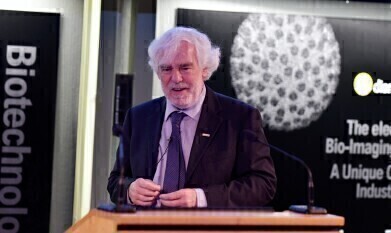-
 Professor Sir David Stuart Director of Life Sciences at Diamond Light Source (Credit: Diamond Light Source)
Professor Sir David Stuart Director of Life Sciences at Diamond Light Source (Credit: Diamond Light Source) -
-view-of-a-key-component-of-the-SARS-CoV-2-virus-called-MPro-(Green-Grey)-with-drug-site-targets-identified-(yellow)---Copyright-of-Diamond-Light-Source,-2021.jpg) (Molecular) view of a key component of the SARS-CoV-2 virus called MPro (Green Grey) with drug site targets identified (yellow) (Credit: Diamond Light Source)
(Molecular) view of a key component of the SARS-CoV-2 virus called MPro (Green Grey) with drug site targets identified (yellow) (Credit: Diamond Light Source)
News & Views
New Oxford collaboration to accelerate UK’s capability against Pandemic threat, Structure-based Drug Discovery and Vaccine design
Jan 20 2023
A new Memorandum of Understanding (MoU) has been reached by the University of Oxford and Diamond Light Source that will facilitate collaboration in the field of pandemic preparedness and promote efforts to address multiple aspects of anti-viral drug discovery.
Richard Cornall, Nuffield Professor of Clinical Medicine and Head of Department of the Nuffield Department of Medicine (NDM) at the University of Oxford said: “Over the years we have had many research collaborations with Diamond including its Electron Bio-Imaging Centre (eBIC). This has been reinforced by a number of high-level joint appointments and secondments of principal investigators between Diamond and NDM. This agreement recognises that our strengths continue to be highly complementary and that by working together we will have the best chance of developing life-saving ways to prevent and treat our most significant pandemic threats.”
Professor Sir Dave Stuart, Life Sciences Director at Diamond and Joint Head of Structural Biology at University of Oxford added: “This new agreement will enable us to identify collaborative research opportunities for joint research and development both of mutual or individual interest and to coherently address multiple aspects of therapy development from anti-viral drug discovery to vaccine design.”
The partnership intends to develop its strength in the following project areas:
- Structure-based drug discovery and development of immuno-therapeutics. Both facilities will look for ways to bring their assets and partnerships to bear on a joint cross disciplinary platform to develop novel class-specific anti-viral drugs and immuno therapeutics. One major shared goal is rapid generation of small molecule and protein hits, refinement to potent leads and in vitro assessment. They may also identify ways to use their shared resources to create a pipeline comprising structure-based drug discovery, in vitro and in vivo assay development, innovative and automated approaches to drug design, advanced enzymology/protein science synthesis and development.
- A second shared aim is focused on structural characterisation of the mode of action of neutralising antibodies or nanobodies and the use of such information in the development of new immuno-therapeutic entities.
- Vaccine design. The facilities will look to identify ways to bring their assets and partnerships to bear on the generation of high-resolution structural data, and appropriate cellular imaging data, to feed into the design of novel vaccines and the refinement and optimisation of vaccination strategies.
In 2021, Oxford established the Pandemic Sciences Institute hosted by NDM, as a multi-disciplinary, university-wide initiative to build upon the model of innovation, collaboration and agility that yielded critical breakthroughs for COVID-19, and to identify and counter future pandemic threats.
Diamond, the UK’s national synchrotron, co-founded the COVID Moonshot , a spontaneous global collaboration that started in March 2020, triggered by data from Diamond’s XChem platform for fragment screening, and rapidly identified potent antivirals targeting the main protease of the SARS-CoV-2 virus. These antivirals are now undergoing a preclinical programme funded by the Wellcome Trust; and data openly shared by Moonshot additionally enabled the identification of another promising COVID-19 drug developed by the Japanese pharmaceutical company Shionogi that is now in late-stage clinical trials.
More information online
Digital Edition
ILM 49.5 July
July 2024
Chromatography Articles - Understanding PFAS: Analysis and Implications Mass Spectrometry & Spectroscopy Articles - MS detection of Alzheimer’s blood-based biomarkers LIMS - Essent...
View all digital editions
Events
Jul 28 2024 San Diego, CA USA
Jul 30 2024 Jakarta, Indonesia
Jul 31 2024 Chengdu, China
ACS National Meeting - Fall 2024
Aug 18 2024 Denver, CO, USA
Aug 25 2024 Copenhagen, Denmark

.jpg)

24_06.jpg)













